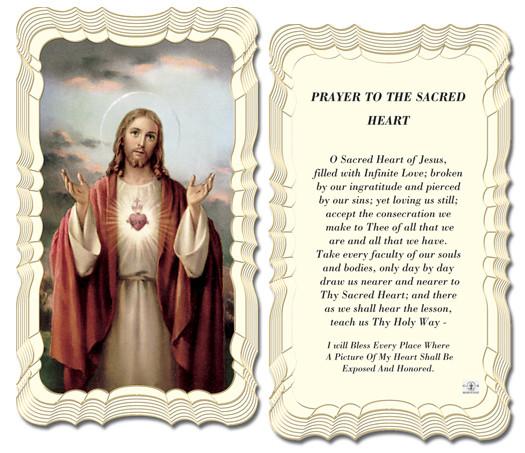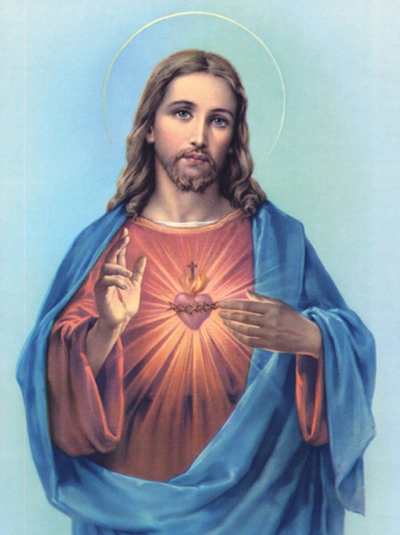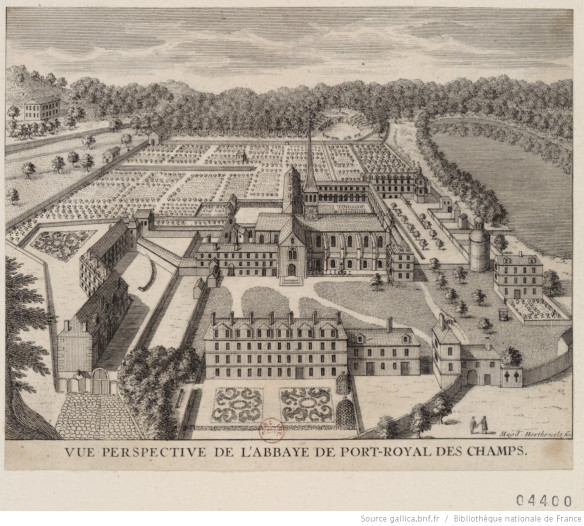
-Statue in Saint Peter’s Basilica, Saint Louis de Montfort, Founder Statue by Giacomo Parisini, 1948, in which St Louis tramples the devil who holds a scroll listing the 7 deadly sins. Please click on the image for greater detail.
When I encounter non-Catholics concerned about the Catholic emphasis on the Blessed Mother, I assure them not to worry they will love her more than Jesus did.
I
La croix dans le mystère
Est voilé pour nous ci-dessous;
Sans grande lumière pour voir,
Qui sa splendeur connaîtra-t-elle?
Seul l’esprit noble
Cette trace secrète élevée;
Et personne ne trouvera le ciel
Qui ne le saisit pas par grâce.
Dieu seul.
The Cross in mystery
Is veiled for us below;
Without great light to see,
Who shall its splendor know?
Alone the lofty mind
Shall this high secret trace;
And none shall heaven find
Who grasps it not by grace.
God Alone.
II
La nature que la croix abhorre;
La raison lui donne un froncement de sourcils;
Le savant l’ignore.
Satan le démolit.
Malgré un art pieux,
Même l’âme fervente
Souvent, cela ne me tient pas à cœur,
Mais joue le rôle du menteur.
Dieu seul.
Nature the Cross abhors;
Reason gives it a frown;
The learned man ignores It.
Satan tears it down.
Despite a pious art,
Even the fervent soul
Oft takes it not to heart,
But plays the liar’s role.
God Alone.
III
L’arbre est essentiel,
Et nous qui connaissons son coût
Doit monter au Calvaire
Ou languir et être perdu.
Comme le dit Saint Augustin
Avec un tollé inquiétant,
Nous sommes tous réprouvés
A moins que Dieu ne nous châtie.
Dieu seul.
Essential is the Tree,
And we who know its cost
Must mount to Calvary
Or languish and be lost.
As Saint Augustine states
With outcry ominous,
We all are reprobates
Unless God chastens us.
God Alone.
IV
Sa nécessité
Une route vers le ciel court:
L’autoroute de la Croix.
C’était le fils royal,
Son chemin vers la vie après la perte.
Et chaque pierre
Qui guide les pieds du pèlerin
Est ciselé juste pour s’adapter
Dans la rue sainte de Sion.
Dieu seul.
Its Necessity
One road to Heaven runs:
The highway of the Cross.
It was the royal Son’s,
His road to life from loss.
And every stone of it
That guides the pilgrim’s feet
Is chiseled fair to fit
In Zion’s holy street.
God Alone.
V
Vain est la victoire
De celui qui, vainqueur
Le monde manque de maîtrise
De soi par la souffrance;
Vain s’il n’a pas Christ,
Tuez le Christ, pour exemplaire,
Ou repousse les sacrifiés
Pour la crainte de blessure et de cicatrice.
Dieu seul.
Vain is the victory
Of him who, conquering
The world, lacks mastery
Of self through suffering;
Vain if he has not Christ,
Slain Christ, for exemplar,
Or spurns the Sacrificed
For dread of wound and scar.
God Alone.
VI
Ses victoires
Croix du Christ, retenant l’enfer,
A vaincu la malédiction d’Eden,
Citadelle de Satan prise d’assaut,
Et a gagné l’univers.
Maintenant à son groupe fidèle
Il donne cette arme brillante
Pour armer le cœur et la main
Contre le mal sprite.
Dieu seul.
Its Victories
Christ’s Cross, restraining Hell,
Has conquered Eden’s curse,
Stormed Satan’s citadel,
And won the universe.
Now to His faithful band
He gives that weapon bright
To arm both heart and hand
Against the evil sprite.
God Alone.
VII
Dans ce signe de bon augure
Tu seras vainqueur,
Dit-il à Constantine,
Qui ce fier Standard portait;
Un augure glorieux,
Dont la valeur prodigieuse
Les dossiers sont tous d’accord
Au paradis et sur terre!
Dieu seul.
In this auspicious Sign
Thou shalt be conqueror,
Said He to Constantine,
Who that proud Standard bore;
A glorious augury,
Of whose prodigious worth
The records all agree
In Heaven and on earth!
God Alone.
VIII
Sa gloire et son mérite
Malgré un sens trompeur
Et le changement inconstant de la raison,
La croix en toute confiance
Nous prenons comme le propre cadeau de la vérité.
Une princesse que nous voyons
En qui, que la foi se confesse,
Nous trouvons toute la charité,
Grâce, sagesse, sainteté.
Dieu seul.
Its Glory and Merit
Despite deceitful sense
And reason’s fickle shift,
The Cross with confidence
We take as Truth’s own gift.
A princess there we see
In whom, let faith confess,
We find all charity,
Grace, wisdom, holiness.
God Alone.
IX
L’amour de Dieu n’a pas pu résister
Une telle beauté ou son appel,
Qui lui a dit de garder un rendez-vous
Avec notre humanité.
Venant sur terre, il a dit:
Ceci, Seigneur, et rien de plus:
Ta croix sauvée enracinée
Ici dans le cœur de mon sein.
Dieu seul.
God’s love could not resist
Such beauty or its plea,
Which bade Him keep a tryst
With our humanity.
Coming to earth, He said:
This, Lord, and nothing more:
Thy saving Cross imbed
Here in My bosom’s core.
God Alone.
X
Il l’a pris, l’a trouvé juste,
Un objet pas honteux
Mais l’honneur, le fait partager
La flamme la plus tendre de son amour.
De l’heure matinale de l’enfance
Son désir gardé en vue
Comme la beauté serait une fleur
La croix de sa joie.
Dieu seul.
He took it, found it fair,
An object not of shame
But honor, made it share
His love’s most tender flame.
From childhood’s morning hour
His longing kept in sight
As beauty would a flower
The Cross of His delight.
God Alone.
XI
Enfin dans sa caresse
Longtemps recherché avec impatience,
Il est mort de tendresse
Et la totalité de l’amour.
Ce cher baptême suprême
Pour lequel son cœur avait pleuré,
La croix est devenue son chrisme,
L’objet de l’amour est indéniable.
Dieu seul.
At last in its caress
Long sought for eagerly,
He died of tenderness
And love’s totality.
That dear supreme baptism
For which His heart had cried,
The Cross became His chrism,
Love’s object undenied.
God Alone.
XII
Le Christ a appelé le pêcheur
Un Satan scandaleux
Quand il grimaça pour scanner
Ce que le Christ porterait pour nous.
La croix du Christ que nous pouvons adorer,
Sa Mère, nous ne pouvons pas.
O mystère et plus!
une merveille au-delà de la pensée!
Dieu seul.
Christ called the Fisherman
A Satan scandalous
When he but winced to scan
What Christ would bear for us.
Christ’s Cross we may adore,
His Mother we may not.
O mystery and more!
a marvel beyond thought!
God Alone.
XIII
Cette croix, maintenant largement dispersée
Sur terre, un jour se lèvera
Transporté, glorifié,
Aux cieux célestes.
Sur une hauteur nuageuse
La croix, brillante,
Doit, par sa vue même,
Jugez à la fois les rapides et les morts.
Dieu seul.
This Cross, now scattered wide
On earth, shall one day rise
Transported, glorified,
To the celestial skies.
Upon a cloudy height
The Cross, full-brillianted,
Shall, by its very sight,
Judge both the quick and dead.
God Alone.
XIV
Vengeance, la croix pleurera
Contre ses ennemis maussades;
Pardon et joie d’en haut
Et la bénédiction pour ceux
D’une fidélité prouvée
Dans la foule immortelle,
Chanter sa victoire
Avec chanson universelle.
Dieu seul.
Revenge, the Cross will cry
Against its sullen foes;
Pardon and joy on high
And blessedness for those
Of proved fidelity
In the immortal throng,
Singing its victory
With universal song.
God Alone.
XV
Dans la vie, les saints aspiraient
Rien que la croix;
«C’était tout ce qu’ils voulaient,
En comptant tout sauf la perte.
Chacun, mécontent
Avec de telles afflictions douloureuses
Comme le châtiment du ciel a envoyé,
Se condamna à plus.
Dieu seul.
In life the Saints aspired
To nothing but the Cross;
‘Twas all that they desired,
Counting all else but loss.
Each one, in discontent
With such afflictions sore
As chastening Heaven sent,
Condemned himself to more.
God Alone.
XVI
Saint-Pierre, en prison,
Il y avait une plus grande gloire
Qu’à Rome, il a gagné
La première chaise du Christ-Vicaire.
Saint André, fidèle, s’écria:
O bonne croix, laisse-moi céder
Pour toi et en toi te cache,
Où la mort dans la vie est scellée.
Dieu seul.
St. Peter, prison-chained,
Had greater glory there
Than when at Rome he gained
The first Christ-Vicar’s chair.
Saint Andrew, faithful, cried:
O good Cross, let me yield
To thee and in thee hide,
Where death in Life is sealed.
God Alone.
XVII
Voyez comment le grand Saint-Paul
Dépeint avec un maigre brillant
Son ravissement mystique,
Mais des gloires à la croix.
Plus admirable encore,
Il est plus riche en mérite,
Derrière son cachot
Que dans son extase.
Dieu seul.
See how the great St. Paul
Depicts with meagre gloss
His rapture mystical,
But glories in the Cross.
More admirable far,
More merit-rich is he,
Behind his dungeon bar
Than in his ecstasy.
God Alone.
XVIII
Ses effets
Sans croix, l’âme
Est lâche et docile;
Comme le feu à un charbon
La croix s’enflamme.
Celui qui n’a pas souffert,
Dans l’ignorance est liée;
Seulement dans le sort dur de la douleur
Est-ce que la sainte sagesse est trouvée.
Dieu seul.
Its Effects
Without a Cross, the soul
Is cowardly and tame;
Like fire to a coal
The Cross sets it aflame.
One who has suffered not,
In ignorance is bound;
Only in pain’s hard lot
Is holy wisdom found.
God Alone.
XIX
Une âme non éprouvée est pauvre
En valeur; nouveau, sans formation,
Avec un destin incertain
Et peu de sagesse a gagné.
O douceur souverain
Que ressentent les affligés
Quand heureux que sa douleur
Aucune consolation humaine ne vole!
Dieu seul.
A soul untried is poor
In value; new, untrained,
With destiny unsure
And little wisdom gained.
O sweetness sovereign
Which the afflicted feels
When pleased that to his pain
No human solace steals!
God Alone.
XX
C’est par la croix seule
La bénédiction de Dieu est conférée,
Et son pardon connu
Dans le mot absolu.
Il veut que tout porte
La marque de ce grand sceau;
Sans cela, rien n’est juste
Pour lui, aucune beauté réelle.
Dieu seul.
‘Tis by the Cross alone
God’s blessing is conferred,
And His forgiveness known
In the absolving word.
He wants all things to bear
The mark of that great seal;
Without it, nought is fair
To Him, no beauty real.
God Alone.
XXI
Partout où la place est donnée
La croix, les choses autrefois profanes
Devenez instinct avec le ciel
Et jeté leur tache.
Sur la poitrine et le front, signe de Dieu,
Porté fièrement pour lui,
Bénira avec Power Divine
Chaque tâche que nous entreprenons.
Dieu seul.
Wherever place is given
The Cross, things once profane
Become instinct with Heaven
And shed away their stain.
On breast and brow, God’s sign,
Worn proudly for His sake,
Will bless with Power Divine
Each task we undertake.
God Alone.
XXII
C’est notre caution,
Notre seule protection,
La pureté blanche de notre espoir,
La perfection de notre âme.
Si précieux est sa valeur
Que les anges apporteraient
L’âme la plus bénie sur terre
Pour partager nos souffrances.
Dieu seul.
It is our surety,
Our one protection,
Our hope’s white purity,
Our soul’s perfection.
So precious is its worth
That Angels fain would bring
The blest soul back to earth
To share our suffering.
God Alone.
XXIII
Ce signe a un tel charme
Que sur l’autel
Le prêtre peut Dieu désarmer
Et tirez-le de son trône.
Au-dessus de l’hôte sacré
Ce signe puissant qu’il joue,
Signale le Saint-Esprit,
Et le Divin obéit.
Dieu seul.
This Sign has such a charm
That at the altar-stone
The priest can God disarm
And draw Him from His throne.
Over the sacred Host
This mighty Sign he plays,
Signals the Holy Ghost,
And the Divine obeys.
God Alone.
XXIV
Avec cet adorable signe
Un parfum est diffusé
Le plus exquis et le plus fin,
Un parfum rarement utilisé.
Le prêtre consacré
Lui fait cette offrande
Comme encens d’Orient,
Rencontrez la couronne du roi du ciel.
Dieu seul.
With this adorable Sign
A fragrance is diffused
Most exquisite and fine,
A perfume rarely used.
The consecrated priest
Makes Him this offering
As incense from the East,
Meet crown for Heaven’s King.
God Alone.
XXV
Sagesse éternelle toujours
Tamise nos pauvres crasses humaines
Pour celui dont le cœur et la volonté
Est digne de la croix,
Cherche toujours un esprit rare
Dont chaque pouls et chaque souffle
Est-ce le courage de supporter
La Croix-Christ jusqu’à la mort.
Dieu seul.
Eternal Wisdom still
Sifts our poor human dross
For one whose heart and will
Is worthy of the Cross,
Still seeks one spirit rare
Whose every pulse and breath
Is fortitude to bear
The Christ-Cross until death.
God Alone.
XXVI
O Croix, laisse-moi me taire;
Dans le discours, je t’abaisse.
Que ma présomption, écrasée,
Son insolence s’efface.
Depuis toi j’ai reçu
Imparfaitement, en partie,
Pardonnez-moi, ami lésé,
Pour mon cœur réticent!
Dieu seul.
O Cross, let me be hushed;
In speech I thee abase.
Let my presumption, crushed,
Its insolence erase.
Since thee I have received
Imperfectly, in part,
Forgive me, friend aggrieved,
For my unwilling heart!
God Alone.
XXVII
Chère Croix, ici en cette heure,
Je m’incline devant toi avec admiration.
Demeurez avec moi au pouvoir
Et enseigne-moi toute ta loi.
Ma princesse, laisse-moi briller
Avec ardeur dans tes bras;
Accorde-moi de savoir chastement
Le secret de tes charmes.
Dieu seul.
Dear Cross, here in this hour,
I bow to thee in awe.
Abide with me in power
And teach me all thy law.
My princess, let me glow
With ardor in thine arms;
Grant me to chastely know
The secret of thy charms.
God Alone.
XXVIII
En te voyant si juste,
J’ai faim de posséder
Ta beauté, mais j’ose
Pas dans mon infidélité.
Viens, maîtresse, par ta volonté
Éveille mon âme faible
Et je te donnerai encore
Un cœur renouvelé et entier.
Dieu seul.
In seeing thee so fair,
I hunger to possess
Thy beauty, but I dare
Not in my faithlessness.
Come, mistress, by thy will
Arouse my feeble soul
And I will give thee still
A heart renewed and whole.
God Alone.
XXIX
Pour la vie je te choisis maintenant,
Mon plaisir, honneur, ami,
Seul objet de mon vœu,
Seule joie à laquelle j’ai tendance.
Par pitié, imprimer, tracer
Vous sur mon coeur,
Mon bras, mon front, mon visage;
Et pas un rougissement ne commencera.
Dieu seul.
For life I choose thee now,
My pleasure, honor, friend,
Sole object of my vow,
Sole joy to which I tend.
For mercy’s sake, print, trace
Yourself upon my heart,
My arm, my forehead, face;
And not one blush will start.
God Alone.
XXX
Je possède avant tout
Je choisis ta pauvreté;
Et pour ma tendresse
Ta douce austérité.
Maintenant sois folle sage
Et toute ta sainte honte
Comme la grandeur à mes yeux,
Ma gloire et ma renommée.
Dieu seul.
Above all I possess
I choose thy poverty;
And for my tenderness
Thy sweet austerity.
Now be thy folly wise
And all thy holy shame
As grandeur in my eyes,
My glory and my fame.
God Alone.
XXXI
Quand, par votre majesté,
Et pour votre gloire,
Tu m’auras vaincu,
Cette conquête que je prendrai
Comme victoire finale,
Bien que digne de ne pas tomber
Sous tes coups, ou sois
Une moquerie pour tous.
Dieu seul.
When, by your majesty,
And for your glory’s sake,
You shall have vanquished me,
That conquest I shall take
As final victory,
Though worthy not to fall
Beneath thy blows, or be
A mockery to all.
God Alone.
-Hymn, Triumph of the Cross by St. Louis de Montfort

God alone.

-by Br Louis Mary Bethea, OP
“Today we also celebrate the great Breton saint, Louis de Montfort. Tall, very strong, stubborn, and with a quick temper…After his seminary studies at St. Sulpice he would begin his missionary life with crushing rejection and resistance. Yet, tromping barefoot from town to town across France, he would be the instrument of great conversion because he trusted in
God alone.
St. Louis embraced the scorn of others, whether it came from a bishop or a supercilious nitwit jeering at him during a mission. Yet he never felt worthy of the mockery that he received: I am not worthy “of being a sign of contradiction to the world.” He attributed the fruits of his labors wholly and rightly to the grace of his Creator. Blossoming from his blessed humility, St. Louis’s famous motto was born:
God alone.
Commonly, when not preaching to the faithful, he would storm the local establishments of ill repute to implore conversions of heart. His frequent companion, Pierre des Bastieres, described one such instance when “one man, furious at this intrusion, drew his sword, and threatened to run him through the body unless he immediately left. […] Completely unperturbed, he looked his assailant straight in the eye and told him that he was very ready to be killed on condition that his murderer would promise to change his way of life. Such courage completely broke the man’s nerve; he trembled so badly that he could scarcely sheathe his sword, and had to grope his way to the door” (The Man Called Montfort, 108). This was the effect of St. Louis because he was a man for
God alone.
St. Louis’s love of Jesus through Mary and his zealous way of life, always yearning for the salvation of souls, stands out as an example to follow, especially when times grow difficult like during our present viral pandemic. Fortified by heavenly consolation, St. Louis was always with the God who dwelt in his heart, enabling his perseverance even to the point of his own demise for the salvation of another…Yet in his humility, St. Louis attributed everything to God, recognizing that God alone was his goal, in God alone is the living bread of life for which man yearns and by which man is saved; he realized that the glory forever belongs to
God alone.”

St. Louis-Marie Grignion de Montfort (1673 – 1716) was born in Brittany, France, to a large farming family. As a child he displayed an unusual spiritual maturity and spent much time in prayer before the Blessed Sacrament. At the age of 19 he went on foot to Paris to study theology at a prestigious school with the support of a benefactor; along the way he gave his possessions to the poor and made a lifelong vow to live in poverty supported entirely on alms. He was ordained a priest at the age of 27, and at 32 discovered his calling to be an itinerant preacher, receiving the title of “Apostolic Missionary” from the Pope after his bishop tried to silence him. For the next 17 years he preached missions in countless towns and villages throughout France with an emphasis on renewal and reform. His fiery devotion, oratory skill, and identification with the poor led many souls to conversion. He was persecuted by the Jansenists, who, in their spiritual pride, poisoned him, banished him from preaching in their dioceses, and made an assassination attempt on his life. He had a profound devotion to the Blessed Virgin Mary and taught on the power of the Holy Rosary. He also wrote a number of classic works on Marian devotion, the most famous being True Devotion to Mary.
“We do find, it is true, great battles to fight, and great hardships to master; but that good Mother makes herself so present and so near to her faithful servants, to enlighten them in their darknesses and their doubts, to strengthen them in their fears, and to sustain them in their struggles and their difficulties, that in truth this virginal path to find Jesus Christ is a path of roses and honey compared with other paths.”
—St. Louis de Montfort
“Pray with great confidence, with confidence based on the goodness and infinite generosity of God and upon the promises of Jesus Christ. God is a spring of living water which flows unceasingly into the hearts of those who pray.”
–St. Louis De Montfort
“Often, actually very often, God allows his greatest servants, those who are far advanced in grace, to make the most humiliating mistakes. This humbles them in their own eyes and in the eyes of their fellow men.”
–St. Louis de Montfort
“O most loving Jesus, deign to let me pour forth my gratitude before Thee, for the grace Thou hast bestowed upon me in giving me to Thy holy Mother through the devotion of Holy Bondage, that she may be my advocate in the presence of Thy majesty and my support in my extreme misery.
Alas, O Lord! I am so wretched that without this dear Mother I should be certainly lost. Yes, Mary is necessary for me at Thy side and everywhere that she may appease Thy just wrath, because I have so often offended Thee; that she may save me from the eternal punishment of Thy justice, which I deserve; that she may contemplate Thee, speak to Thee, pray to Thee, approach Thee and please Thee; that she may help me to save my soul and the souls of others; in short, Mary is necessary for me that I may always do Thy holy will and seek Thy greater glory in all things.
Ah, would that I could proclaim throughout the whole world the mercy that Thou hast shown to me ! Would that everyone might know I should be already damned, were it not for Mary! Would that I might offer worthy thanksgiving for so great a blessing! Mary is in me.
Oh, what a treasure! Oh, what a consolation! And shall I not be entirely hers? Oh, what ingratitude! My dear Saviour, send me death rather than such a calamity, for I would rather die than live without belonging entirely to Mary. With St. John the Evangelist at the foot of the Cross, I have taken her a thousand times for my own and as many times have given myself to her; but if I have not yet done it as Thou, dear Jesus, dost wish, I now renew this offering as Thou dost desire me to renew it.
And if Thou seest in my soul or my body anything that does not belong to this august Princess, I pray Thee to take it and cast it far from me, for whatever in me does not belong to Mary is unworthy of Thee.
O Holy Spirit, grant me all these graces. Plant in my soul the Tree of true Life, which is Mary; cultivate it and tend it so that it may grow and blossom and bring forth the fruit of life in abundance.
O Holy Spirit, give me great devotion to Mary, Thy faithful spouse; give me great confidence in her maternal heart and an abiding refuge in her mercy, so that by her Thou mayest truly form in me Jesus Christ, great and mighty, unto the fullness of His perfect age. Amen.”
“My Jesus, I long ardently For you to come to me this day; Without you life is misery. Come to me soon, I pray. Without the fervor that you bring, O Love, I languish night and day; And do you not desire my love? Inflame my heart, I pray. Good Shepherd, bear your lost sheep home Within your arms, whene’er I stray; From ravening wolves that round me roam Oh, keep me safe, I pray. O bread of Life, for you I sigh,
Give me yourself without delay; For otherwise my soul must die. Give me to eat, I pray. O fount of living waters clear, How long and weary is the way; Refresh my soul which thirsts for you. Give me to drink, I pray. O loving Lord, my soul is chilled By icy winds that round me play; O fire of love, let me be filled With warmth from you, I pray. Like the blind man who cried to you: Have mercy on me, Lord, I say, O Mary’s Son, that I may see; Increase my faith, I pray. Lord, I am sick beyond all cure, But with a word you can display Your power; without you death is sure. O heal me, Lord, I pray. My Lord, I knock upon your door; Your favors I can ne’er repay, Yet in my want I beg for more. Fulfill my needs, I pray. I am not worthy, Lord, that you Should come into my house today As heavenly food; say but the word And heal my soul, I pray. Lord, you alone are my true friend, My treasure which can ne’er decay; All earthly joys do you transcend. Do visit me this day.”
-Saint Louis Grignion de Montfort
“Hail Mary, beloved Daughter of the Eternal Father! … May the light of thy faith dispel the darkness of my mind; may thy profound humility take the place of my pride; may thy sublime contemplation check the distractions of my wandering imagination; may thy continuous sight of God fill my memory with His presence; may the burning love of thy heart inflame the lukewarmness of mine; may thy virtues take the place of my sins; may thy merits be my only adornment in the sight of God and make up for all that is wanting in me. Finally, dearly beloved Mother, grant, if it be possible, that I may have no other spirit but thine to know Jesus and His divine will; that I may have no other soul but thine to praise and glorify the Lord; that I may have no other heart but thine to love God with a love as pure and ardent as thine I do not ask thee for visions, revelations, sensible devotion or spiritual pleasures. It is thy privilege to see God clearly; it is thy privilege to enjoy heavenly bliss; it is thy privilege to triumph gloriously in Heaven at the right hand of thy Son and to hold absolute sway over angels, men and demons; it is thy privilege to dispose of all the gifts of God, just as thou willest.”
-St. Louis de Montfort
“Often, actually very often, God allows his greatest servants, those who are far advanced in grace, to make the most humiliating mistakes. This humbles them in their own eyes and in the eyes of their fellow men.”
-St. Louis de Montfort
“Be one of the small number who find the way to life, and enter by the narrow gate into Heaven. Take care not to follow the majority and the common herd, so many of whom are lost. Do not be deceived; there are only two roads: one that leads to life and is narrow; the other that leads to death and is wide. There is no middle way.”
–St. Louis de Montfort
“True devotion to Our Lady is constant. It confirms the soul in good, and does not let it easily abandon its spiritual exercises. It makes it courageous in opposing the world in its fashions and maxims, the flesh in its weariness and passions, and the devil in his temptations; so that a person truly devout to our Blessed Lady is neither changeable, irritable, scrupulous nor timid. It is not that such a person does not fall, or change sometimes in the sensible feeling of devotion. But when he falls, he rises again by stretching out his hand to his good Mother. When he loses the taste and relish of devotions, he does not become disturbed because of that; for the just and faithful client of Mary lives by the faith (Heb. 10:38) of Jesus and Mary, and not by natural sentiment.”
—St. Louis De Montfort, True Devotion to Mary
“God the Father has communicated to Mary His Fruitfulness, as far as a mere creature was capable of it, in order that He might give her the power to produce His Son, and all the members of His mystical Body.
—St. Louis de Montfort, True Devotion to Mary
“If we do not risk anything for God we will never do anything great for Him.”
–St. Louis De Montfort
“Dearly beloved Mother, grant, if it is possible, that I may have no other spirit but yours to know Jesus and his divine will; that I may have no other soul but yours to praise and glorify the Lord; that I may have no other heart but yours to love God with a love as pure and passionate as yours. I do not ask you for visions, revelations, feelings of devotion, or spiritual pleasures. It is your privilege to see God clearly; it’s your privilege to enjoy heavenly bliss; it’s your privilege to triumph gloriously in heaven at the right hand of your Son and to hold absolute sway over angels, men, and demons; it is your privilege to dispose of all the gifts of God, just as you wish . . . The only grace I beg you to obtain for me is that every day and every moment of my life I may say: Amen, so be it, to all that you did while on earth; amen, so be it, to all that you are now doing in heaven; amen, so be it, to all that you are doing in my soul, so that you alone may fully glorify Jesus in me for time and eternity.”
—St. Louis de Montfort
“True devotion to Our Lady is holy; that is to say, it leads the soul to avoid sin and to imitate the virtues of the Blessed Virgin, particularly her profound humility, her lively faith, her blind obedience, her continual prayer, her universal mortification, her divine purity, her ardent charity, her heroic patience, her angelic sweetness and her divine wisdom. These are the ten principal virtues of the most holy Virgin.”
— St. Louis De Montfort, True Devotion to Mary
“All our perfection consists in being conformed, united and consecrated to Jesus Christ; and therefore the most perfect of all devotions is, without any doubt, that which the most perfectly conforms, unites and consecrates us to Jesus Christ. Now, Mary being the most conformed of all creatures to Jesus Christ, it follows that, of all devotions, that which most consecrates and conforms the soul to Our Lord is devotion to His holy Mother, and that the more a soul is consecrated to Mary, the more it is consecrated to Jesus.”
—St. Louis De Montfort, True Devotion to Mary
“True devotion to Our Lady is interior; that is, it comes from the mind and the heart. It flows from the esteem we have for her, the high idea we have formed of her greatness, and the love which we have for her. It is tender; that is, full of confidence in her, like a child’s confidence in his loving mother … It implores the aid of its good Mother at all times, in all places and above all things: in its doubts, that it may be enlightened; in its wanderings, that it may be brought into the right path; in its temptations, that it may be supported; in its weaknesses, that it may be strengthened; in its falls, that it may be lifted up; in its discouragements, that it may be cheered; in its scruples, that they may be taken away; in the crosses, toils and disappointments of life, that it may be consoled under them. In a word, in all the evils of body and mind, the soul ordinarily has recourse to Mary, without fear of annoying her or displeasing Jesus Christ.”
—St. Louis De Montfort, True Devotion to Mary
“Let us say boldly with St. Bernard that we have need of a mediator with the Mediator Himself, and that it is the divine Mary who is the most capable of filling that charitable office. It was through her that Jesus Christ came to us, and it is through her that we must go to Him. If we fear to go directly to Jesus Christ, our God, whether because of His infinite greatness or because of our vileness or because of our sins, let us boldly implore the aid and intercession of Mary, our Mother. She is good, she is tender, she has nothing in her austere and forbidding, nothing too sublime and too brilliant. In seeing her, we see our pure nature.”
—St. Louis de Montfort, True Devotion to Mary
“When will the happy time come when the divine Mary will be established Mistress and Queen of all hearts, in order that she may subject them fully to the empire of her great and holy Jesus? When will souls breathe Mary as the body breathes air? When that time comes, wonderful things will happen in those lowly places where the Holy Ghost, finding His dear spouse, as it were, reproduced, in all souls, shall come in with abundance, and fill them to overflowing with His gifts, and particularly with the gift of wisdom, to work miracles of grace.”
—St. Louis de Montfort, True Devotion to Mary
“You never think of Mary without Mary interceding for you with God. You never praise or honor Mary without Mary’s praising and honoring God with you. She is the echo of God, that says nothing and repeats nothing but God. If you say `Mary,’ She says `God.’ St. Elizabeth praised Mary and called Her blessed because She had believed. Mary, the faithful echo of God, at once intoned: `My soul magnifies the Lord (Lk 1: 46). What Mary did then, She does daily. When we praise, love, honor, or give anything to Her, it is God who is praised, God who is loved, God who is glorified, and it is to God that we give, through Mary and in Mary.”
“We ask for the grace of receiving Communion as Mary received the Word and letting it become flesh again in me; for the grace to receive the Eucharist from the hands of the Church, putting our hands out like a paten (meaning manger), feeling that it is our Lady who places the host there and entrusts it to us; for the grace to sing with Mary the Magnificat in that moment of silence that follows communion; the grace to look forward in the Eucharist all that will be in our day or week, with all the good and positive offered together with the bread, and all that is suffering and passion offered along with the wine; for the grace to believe and to put with love all our hope in that first fruit and pledge of salvation that we already have in each Eucharist, to then shape our lives in the image of what we receive.”
—St. Louis de Montfort, True Devotion to Mary
“The Cross is good because it is an abundant source of all kinds of delight and consolation. It brings joy, peace, and grace to the soul.”
-St. Louis de Montfort (The Love of Eternal Wisdom, 95-96)
“Never the Cross without Jesus; nor Jesus without the Cross.” -St Louis de Montfort (The Love of Eternal Wisdom, 91).
“Friends of Jesus Christ, drink of His bitter cup, and your friendship with Him will increase. Suffer with Him and you will be glorified with Him. Suffer patiently and even cheerfully. Yet a little while and the moment of suffering will be changed into an eternity of happiness” -St Louis de Montfort (The Love of Eternal Wisdom, 95).
“Only he will receive, will find, and will enter who perseveres in asking, seeking, and knocking. It is not enough to ask Almighty God for certain graces for a month, a year, ten, or even twenty years; we must never tire of asking. We must keep on asking until the very moment of death, and even in this prayer that shows our trust in God, we must join the thought of death to that of perseverance and say; “Although he should kill me, I will trust in him” (Job 13:15) and will trust Him to give me all I need.”
–St. Louis Mary de Montfort

Love,
Matthew



















